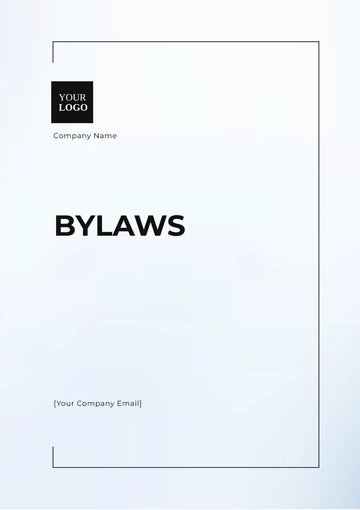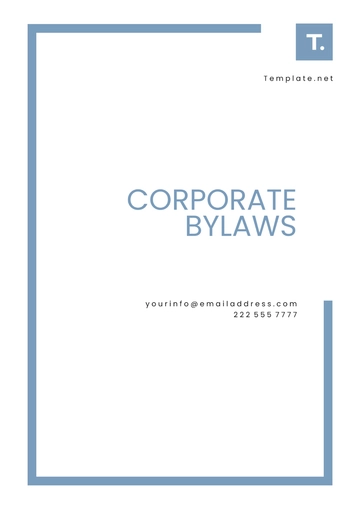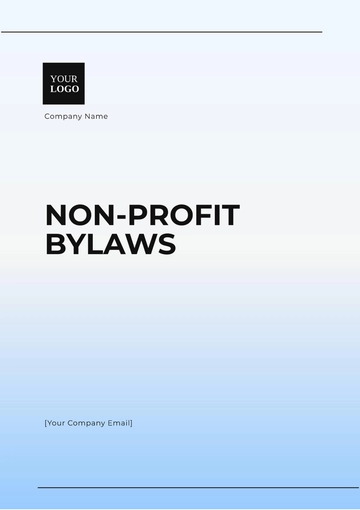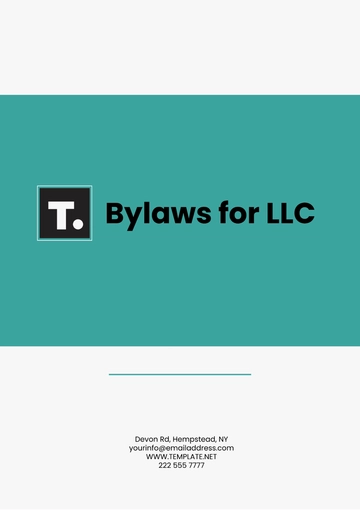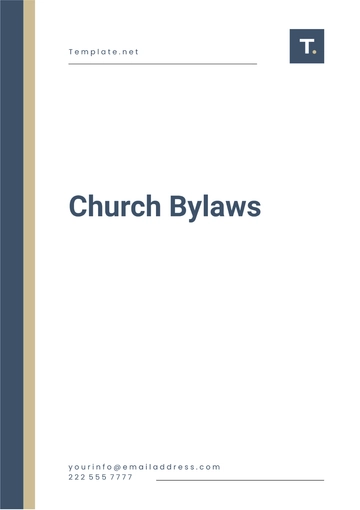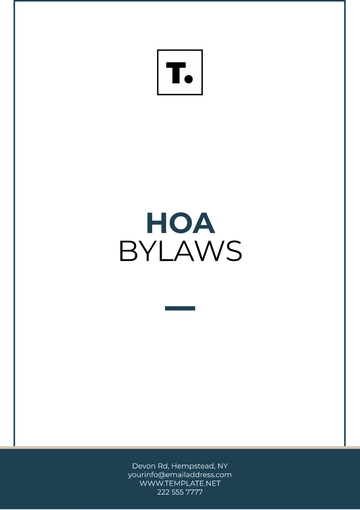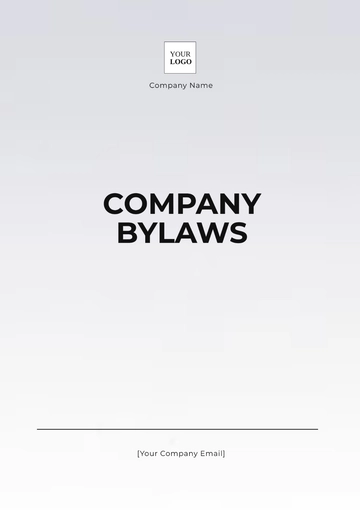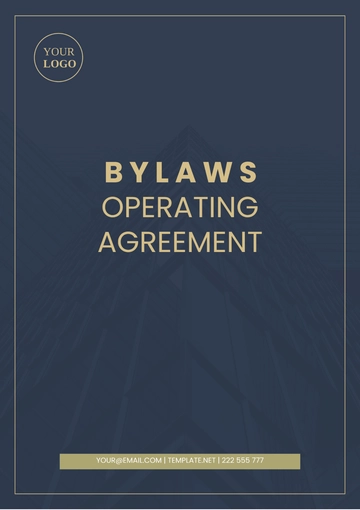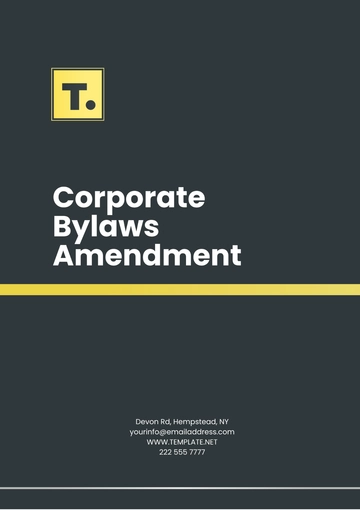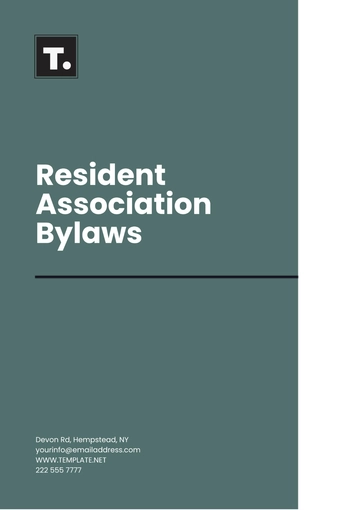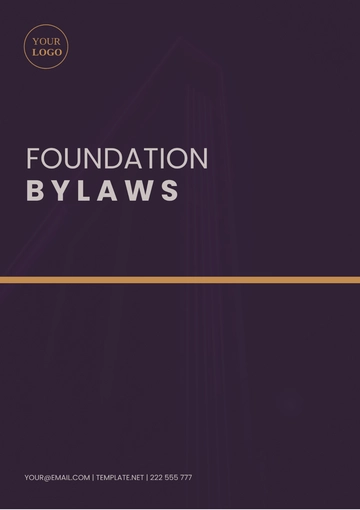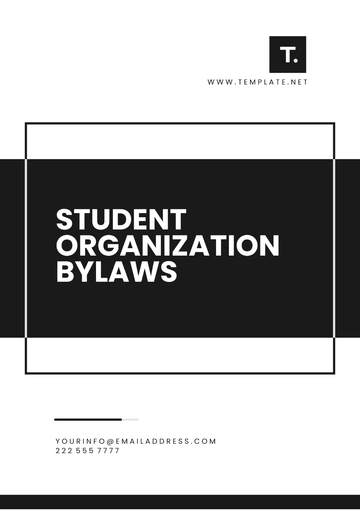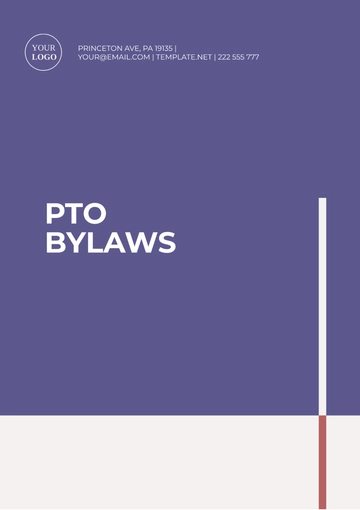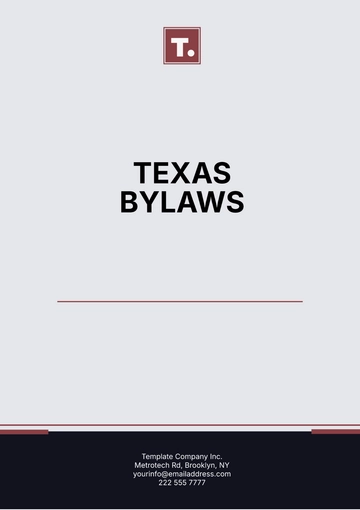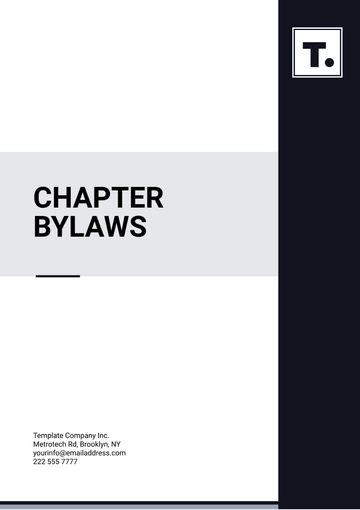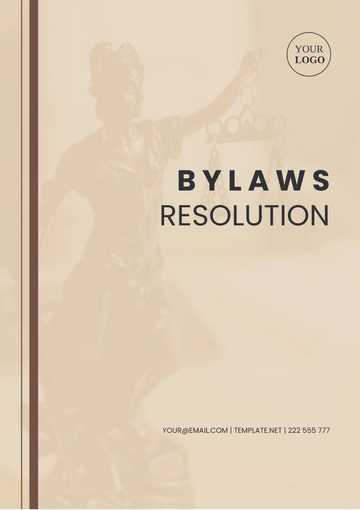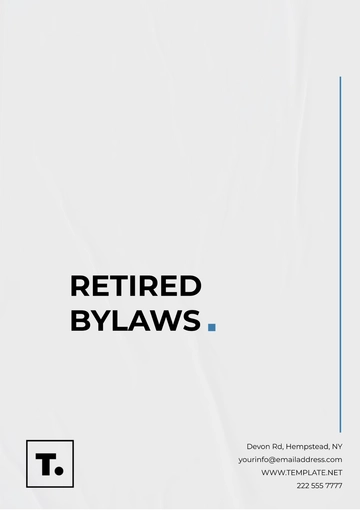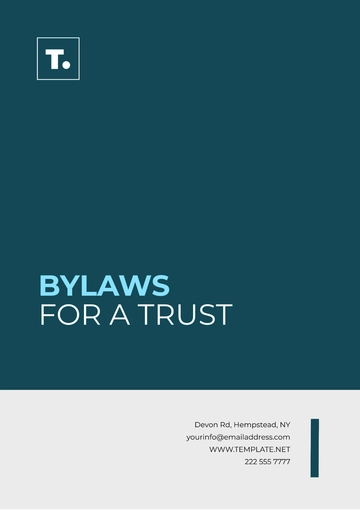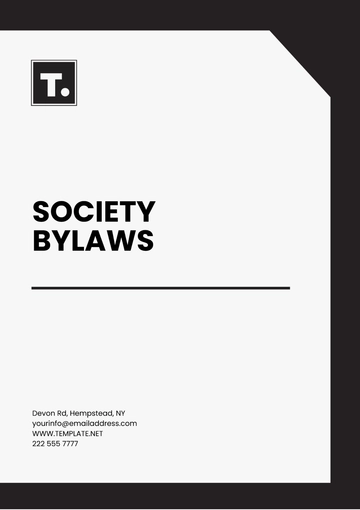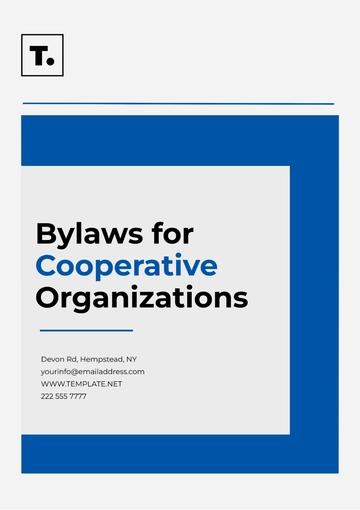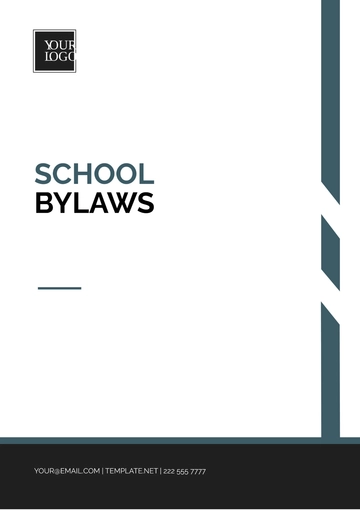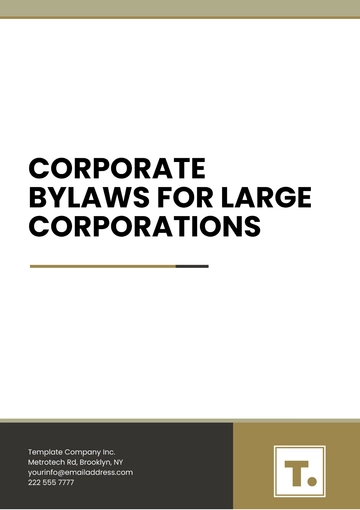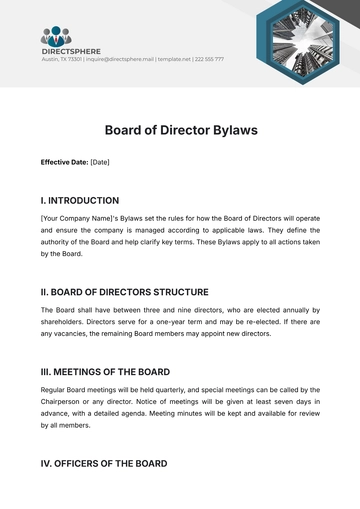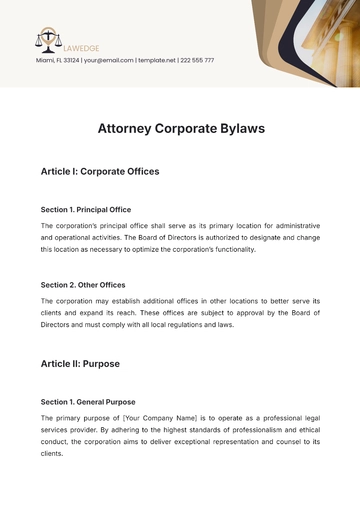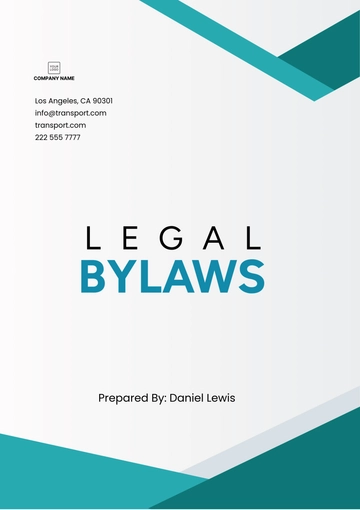Free Legal Corporate Bylaws
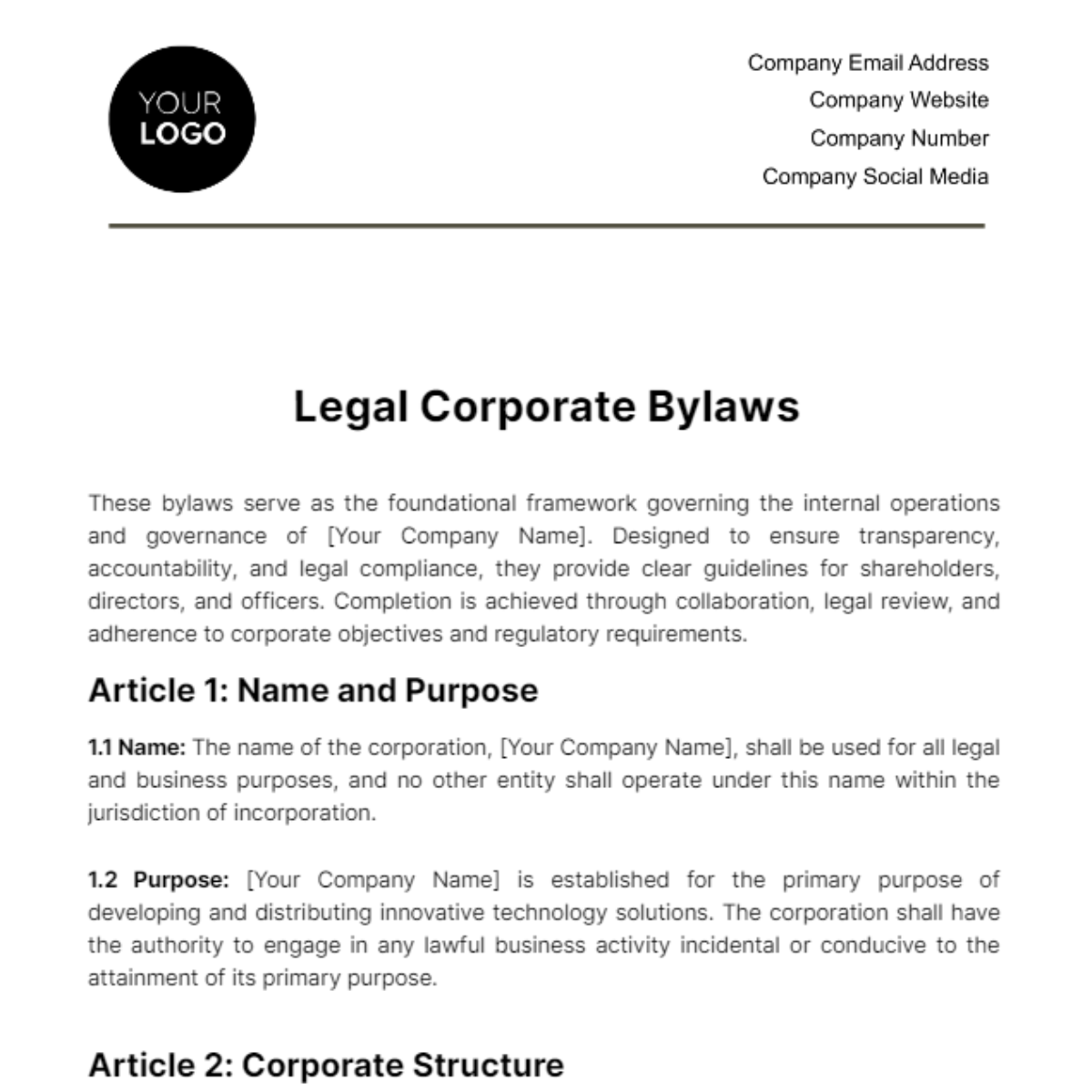
These bylaws serve as the foundational framework governing the internal operations and governance of [Your Company Name]. Designed to ensure transparency, accountability, and legal compliance, they provide clear guidelines for shareholders, directors, and officers. Completion is achieved through collaboration, legal review, and adherence to corporate objectives and regulatory requirements.
Article 1: Name and Purpose
1.1 Name: The name of the corporation, [Your Company Name], shall be used for all legal and business purposes, and no other entity shall operate under this name within the jurisdiction of incorporation.
1.2 Purpose: [Your Company Name] is established for the primary purpose of developing and distributing innovative technology solutions. The corporation shall have the authority to engage in any lawful business activity incidental or conducive to the attainment of its primary purpose.
Article 2: Corporate Structure
2.1 Definitions: In these bylaws, "Board of Directors" refers to the governing body responsible for overseeing the strategic direction and policies of the corporation. "Officers" are individuals appointed by the board to manage the day-to-day operations, while "Shareholders" are owners of the corporation who hold voting rights and receive dividends.
2.2 Identification: The corporation shall maintain accurate records identifying all shareholders, directors, and officers, including their contact information, shareholdings, and roles within the organization. These records shall be kept confidential and updated promptly upon any changes to the corporate structure.
Article 3: Meetings of Shareholders
3.1 Notice Requirements: Notice of any meeting of shareholders shall be given in writing or electronically, specifying the date, time, and location of the meeting, as well as the agenda items to be discussed. Such notice shall be sent to each shareholder at their address as it appears on the corporation's records.
3.2 Quorum: A quorum for the transaction of business at any meeting of shareholders shall be determined based on the percentage of voting shares present either in person or by proxy. If a quorum is not present, the meeting may be adjourned to a later date as determined by the chairperson of the meeting.
3.3 Voting Procedures: Shareholders shall have the right to vote on matters brought before them at any meeting, with each share entitled to one vote. Voting may be conducted in person, by proxy, or by electronic means as permitted by applicable law and these bylaws.
3.4 Proxy Voting: Shareholders may appoint proxies to vote on their behalf at shareholder meetings, provided that such proxies are submitted to the corporation in writing or electronically prior to the meeting in accordance with procedures established by the board of directors.
Article 4: Board of Directors
4.1 Number and Qualifications: The board of directors shall consist of a minimum of [0] and a maximum of [0] directors, each of whom shall be elected by the shareholders at the annual meeting. Directors shall possess the qualifications specified in the corporation's articles of incorporation and shall act in the best interests of the corporation and its shareholders.
4.2 Duties and Powers: The board of directors shall have the duty to oversee the management of the corporation's business and affairs, including the adoption of corporate policies, approval of major corporate transactions, and appointment of officers. The board shall exercise all powers of the corporation that are not expressly reserved to the shareholders by law or by these bylaws.
4.3 Committees: The board of directors may establish committees as necessary to assist in the discharge of its duties, including but not limited to audit, compensation, and governance committees. Each committee shall have the authority and responsibilities delegated to it by the board and shall operate in accordance with any applicable committee charters adopted by the board.
4.4 Removal and Vacancies: Directors may be removed from office, with or without cause, by the vote of a majority of the voting power of the outstanding shares entitled to vote. Any vacancies on the board of directors, whether resulting from removal, resignation, or other cause, may be filled by the affirmative vote of a majority of the remaining directors, even if less than a quorum.
Article 5: Officers
5.1 Titles and Duties: The officers of the corporation shall include a President, a Secretary, and a Treasurer, each of whom shall be appointed by the board of directors. The President shall oversee the overall management and operations of the corporation, the Secretary shall be responsible for maintaining corporate records and ensuring compliance with legal requirements, and the Treasurer shall oversee financial matters and reporting.
5.2 Appointment and Removal: Officers shall be appointed by the board of directors and may be removed from office with or without cause by a majority vote of the board. Any officer may hold multiple offices simultaneously, provided that such simultaneous service is not prohibited by law or these bylaws.
5.3 Authority and Responsibilities: Officers shall have the authority to take actions and make decisions within the scope of their designated roles and responsibilities as established by the board of directors. They shall exercise their powers and perform their duties with the care and diligence that a reasonably prudent person in a similar position would use under similar circumstances.
Article 6: Corporate Governance
6.1 Indemnification: The corporation shall indemnify its directors and officers to the fullest extent permitted by law against expenses, judgments, fines, settlements, and other amounts incurred in connection with any legal proceeding arising out of their service to the corporation. The corporation may purchase and maintain insurance on behalf of any person who is or was a director, officer, employee, or agent of the corporation against any liability asserted against such person and incurred in any such capacity.
6.2 Conflict of Interest: Directors and officers shall promptly disclose to the board any potential conflicts of interest that may arise in the course of their duties. Any director or officer with a material interest in a transaction involving the corporation shall abstain from voting on such transaction and shall comply with any additional procedures established by the board to address conflicts of interest.
6.3 Related Party Transactions: Any transaction between the corporation and any director, officer, or affiliate thereof shall be conducted on arm's length terms and conditions comparable to those that could be obtained in an ordinary course of business transaction with unrelated third parties. The board of directors shall review and approve any related party transaction that exceeds a threshold established by the board or is otherwise required by applicable law.
Article 7: Stock and Dividends
7.1 Issuance of Stock: The board of directors shall have the authority to authorize the issuance of shares of stock of the corporation, including the determination of the rights, preferences, privileges, and restrictions of such shares. The issuance of stock may be subject to any applicable legal requirements, including the approval of the shareholders if required by law or the corporation's articles of incorporation.
7.2 Transfer of Shares: Shares of stock of the corporation may be transferred only upon compliance with procedures established by the board of directors, which may include restrictions on transferability, rights of first refusal, or other conditions. The corporation may require any person seeking to transfer shares to provide such information and assurances as the board deems necessary to ensure compliance with applicable securities laws and these bylaws.
7.3 Dividend Declarations: Dividends may be declared and paid by the board of directors out of funds legally available for such purpose, subject to the corporation's financial condition, capital requirements, and any restrictions imposed by law or the corporation's articles of incorporation. Dividends may be declared in cash, stock, or other property, as determined by the board in its discretion, and shall be paid to shareholders of record as of the record date established by the board.
Article 8: Amendments to Bylaws
8.1 Process for Amendment: These bylaws may be amended by the vote of a majority of the voting power of the outstanding shares of the corporation entitled to vote at any meeting of shareholders duly called and held for such purpose. Any proposed amendment to these bylaws shall be set forth in the notice of the meeting or shall be provided to shareholders in writing prior to the meeting.
8.2 Required Vote or Consent: In addition to any other voting requirements imposed by law, the approval of any amendment to these bylaws shall require the affirmative vote or written consent of the holders of a majority of the outstanding shares entitled to vote on such amendment. Any amendment to these bylaws shall become effective upon the date of adoption by the shareholders, unless a later effective date is specified in the amendment.
Article 9: Miscellaneous Provisions
9.1 Corporate Seal: The corporation may, but shall not be required to, adopt a corporate seal, which may be in such form as the board of directors may determine. The use of the corporate seal shall be at the discretion of the corporation and shall not be required to authenticate any document or instrument executed by or on behalf of the corporation.
9.2 Fiscal Year: The fiscal year of the corporation shall be the calendar year, unless otherwise determined by the board of directors. The corporation shall maintain accurate financial records and prepare financial statements in accordance with generally accepted accounting principles consistently applied.
9.3 Record-Keeping and Inspection Rights: The corporation shall maintain accurate and complete records of its affairs, including its articles of incorporation, bylaws, minutes of meetings, and share register. Shareholders shall have the right to inspect and copy such records upon written request to the corporation at its principal office during normal business hours, subject to any restrictions imposed by law or the board of directors.
9.4 Severability: If any provision of these bylaws shall be held to be invalid, illegal, or unenforceable, the validity, legality, and enforceability of the remaining provisions shall not in any way be affected or impaired thereby. In such event, the parties shall negotiate in good faith to replace the invalid, illegal, or unenforceable provision with a valid, legal, and enforceable provision that achieves to the greatest extent possible the intended economic, legal, and commercial result of the invalid, illegal, or unenforceable provision.
Article 10: Effective Date and Adoption
10.1 Date of Adoption: These bylaws were adopted by the board of directors of [Your Company Name] on [Month Day, Year], and shall become effective immediately upon adoption. Any prior bylaws of the corporation are hereby repealed in their entirety.
10.2 Signatures: The undersigned, being the duly appointed [Name of Secretary/Incorporator] of [Your Company Name], certifies that the foregoing bylaws were duly adopted by the board of directors of the corporation on the date set forth above.

[Your Name]
[Month Day, Year]
- 100% Customizable, free editor
- Access 1 Million+ Templates, photo’s & graphics
- Download or share as a template
- Click and replace photos, graphics, text, backgrounds
- Resize, crop, AI write & more
- Access advanced editor
Discover the ultimate solution for crafting impeccable Legal Corporate Bylaws with Template.net. Our editable and customizable template, powered by an intuitive AI Editor Tool, streamlines the process, ensuring precision and compliance. Tailor-made to fit your corporation's unique needs, this resource empowers you to effortlessly draft comprehensive bylaws that stand the test of legal scrutiny.
